aking a walk through the dark side of America’s vampire subculture or exploring the minds of serial killers may not be every writer’s cup of tea, but writer and professor of forensic psychology Dr. Katherine Ramsland has made a career out of analyzing and writing about the shadowy side of human nature.
Katherine has a Master’s degree in forensic psychology from John Jay College of Criminal Justice, a Ph.D in philosophy from Rutgers University, where she taught philosophy for many years, and a Master’s degree in clinical psychology from Duquesne University. She also holds a Bachelor’s degree in philosophy and psychology from Northern Arizona University. In addition to her many writing projects, Ramsland is the chair of the social sciences department at DeSales University in Center Valley, PA.
The author or co-author of 35 nonfiction books about everything from health care serial killers (Inside the Minds of Health Care Serial Killers) and real life ghost stories (Bethlehem Ghosts) to how to write guides (Bliss: Writing to Find Your True Self) and biographies of Dean Koontz (Dean Koontz: A Writer’s Biography)and Anne Rice (Prism of the Night: A Biography of Anne Rice),
Ramsland is comfortable walking the fine line between the real and the unimaginable. For her latest book, The Real World of Forensic Science: Renowned Experts Reveal What It Takes to Solve Crimes, Katherine collaborated with renowned forensic scientist Henry C. Lee and forensics expert Elaine M. Pagliaro.
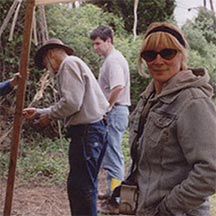
“If Bluebeard told me not to look in the secret room, not only would I look, I’d empty every trunk and write a book about it before he returned.”
Photos: courtesy of Katherine’s website.
WOW: Katherine, you write about the subjects that both fascinate and frighten people—murderers, ghosts, vampires, and paranormal investigation, just to name a few. What has attracted you to the shadowy side of human nature?
Katherine: I’m afraid that’s a mystery I don’t try to solve, because it probably has something to do with deep family legacies that fuel my inarticulate subconscious. However, it’s clear that everything I do that truly engages me has this dark, edgy quality. Vampires, ghosts, corpses, serial killers, death investigations, cemeteries—they all take me into the shadows where most people fear to tread. I have always moved toward what makes me anxious rather than away, and as a result I’ve developed a curiosity about what’s behind the door that gives me a rush. If Bluebeard told me not to look in the secret room, not only would I look, I’d empty every trunk and write a book about it before he returned.
WOW: Forensic science has become such a popular subject thanks to shows like CSI, NCIS, and the like. Why do you think people have such a fascination with it?
Katherine: Everyone loves a puzzle and these shows offer intricate puzzles in the frame of intrigue and danger, with likable characters about whom you care. They’re on heroes’ journeys. NCIS is among the best, in part because the team chemistry is so fun and because there are many dark secrets (and plot possibilities) among the agencies with which the agents must deal. Once audiences invest in characters, they like to watch week after week as those characters take on new challenges and grow emotionally from things they see. Another reason for the popularity of the forensic shows (although it has declined this past year due to overexposure and plot repetition), is that when it first got rolling, viewers were invited into a new world, with special effects and edgy, gruesome visuals they’d never seen before.
We’d been primed for this by the endless televised hours of the nine-month-long O. J. Simpson trial in 1995. Viewers who listened to what crime investigators and lab analysts did (or failed to do) had the impression they had a front-row seat, like the jury, and could make their own determinations about the defendant’s guilt or innocence. Plain and simple, it was a forensic soap opera, with unique characters, courtroom fashions, forceful personalities, and sexual secrets, not to mention racial issues. For months, this trial became a primary source of entertainment across America, with people betting on the outcome. It was just a matter of time before someone thought it was worth making forensic scientists into fictional celebrities. The audience was certainly ready for it.
WOW: Obviously, the books you write require extensive research. Can you tell me a bit about some of the methods you’ve used?
Katherine: My approach is to immerse, so I need to attach to a subject that has plenty of interesting layers. As I read or merely pay attention, I come across a topic that quickens my interest, so I start looking for every source I can find. Not all of these immersion excursions become books, but most turn up in my writing somewhere. From among the most interesting sources, I start contacting people associated with it: experts, participants, perpetrators, victims. I lose myself in it, whether it’s a biography, a historical treatise, an adventure, or a novel, and I don’t start writing until a lot of information has settled in. I pay attention to my dreams and I allow my thesis—the beating heart—to form organically from the way the information gets organized in my psyche. Then I’ll start to take notes, but I typically write in a fast whirlwind of long, intense hours over many weeks.
Once I get the gist of what I want, I do more research. Whenever I’m on a project, certain things stand out to me that I might not otherwise notice. They get absorbed into my growing ball of wax and may lead me down unexpected paths (although I try to follow paths that retain the heat of the momentum). It’s difficult to tell exactly where I’m going until the wax starts to harden. That’s a signal to me that I’m ready to finish this project and move on. And once I do move on, I’m really done. I don’t like revisiting a subject to rehash it again. There are just too many other things out there. For me, the dopamine rush comes from exploring new things, not revising the old.
WOW: For your book Piercing the Darkness, you went undercover with members of a real-life underground vampire club. How did you find these folks, and what did you do to prepare?
Katherine: I jumped in. Seriously. I’d read plenty of vampire novels, but it was the incident of a missing reporter in New York who was investigating the vampire subculture that inspired the idea, and it was my literary agent who gently pushed me toward it. To that point, I had never written immersion journalism. In fact, I’d never even had a journalism course. However, because of my work on Anne Rice’s books, it wasn’t hard to get invited to a vampire club, and that’s how it started. The person who invited me also fitted me with custom-made fangs and showed me where I could buy the right clothes for going to the club.
I describe all of this in Piercing the Darkness, because my MO as a writer in those three books (Ghost and Cemetery Stories) was to take readers with me on my journey of discovery.
Once I was inside, it wasn’t hard to get connected to vampire groups in other cities and other countries. It was just a matter of how much courage I could generate and how far I was willing to travel. Of course, Paris was on my list! There was no shortage of people willing to talk with me and invite me places. However, I do attribute this to my association with Rice’s vampire novels and the book I wrote, The Vampire Companion.
Only afterward did I write my own vampire novels, in which I wrote a fictional account of what happened to the missing reporter.
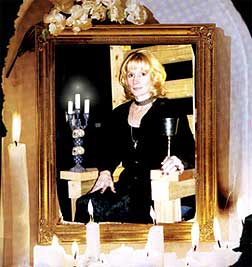
“I’ve come to view myself as a ghost repellant because it seems as if whenever I arrive, that’s a sure way to clear the room of paranormal phenomena.”
WOW: In keeping with the supernatural theme, can you tell us a bit about what it was like to go ghost hunting and work with paranormal investigators for your book Ghost?
Katherine: Having searched for ghosts most of my life, it was exciting to get the chance to write a book in which I documented learning about the various instruments that ghost hunters use. I really knew very little until they showed me. I certainly encountered people who were frauds, but I had experiences and learned techniques that were interesting, fun, and sometimes scary. While I would still say “I want to believe” more than “I do believe,” I continue to investigate. In fact, I’ve come to view myself as a ghost repellant because it seems as if whenever I arrive, that’s a sure way to clear the room of paranormal phenomena. I’ve had so many people “guarantee” me an experience which never quite worked out that I can only believe I must be the water on their fire. Who knows?
I’ll keep trying. I like being scared and I’ve certainly had that experience in pitch-black haunted rooms, but maybe that says more about me than about the paranormal. I think the world is a better place with ghosts in it, so I will continue to look for them, even if they keep running from me.
WOW: You must have found yourself in plenty of heart-pounding situations through the course of your research. Has there ever been a time when you thought, “Okay, I’ve gone too far?”
Katherine: For Piercing the Darkness, when I agreed to meet a stranger out in the woods, alone, and he began to speak about how he and a partner had committed numerous murders, I had second thoughts. Whether it was true or not, I had no idea if he might be dangerous to me, and I realized that no one knew where I was. He had the advantage, so I vowed not to turn my back. I did get away (obviously), but it was a risk that, in retrospect, seems dumb. Still, I must say that it’s the best story in the book. I took other risks, but none that made me think I was in over my head. Yet, in saying that, I will admit I seem to have less fear than most people and will go into situations that others think are crazy. (My editor asked me to tell her what I was doing only after I got back, because she got too worried.)
I look for a good story. Sometimes that means taking a risk. If I’m not willing to do that, I might as well stop writing.
WOW: Are there any other memorable experiences that you can tell us about?
Katherine: I just mentioned one, and another was when I first learned about EVP, electronic voice phenomenon. I went with Rick Fisher of Paranormal Pennsylvania to one of his favorite country cemeteries. He'd told me about disembodied voices that he had gotten on tape in various graveyards, and one had told him to "Get out!" The area recently had experienced a serious drought and that night a major storm was on its way. This is a prime condition, I was told, for surges of electromagnetic activity. Rick had a video camera with "nightvision" capabilities, while I had a small digital recorder.
We entered the cemetery, which had around three dozen graves surrounded by a thigh-high stone wall. Rick walked around with his video camera and I sat down on the grass and pulled out my tape recorder and asked the standard question, "Does anyone want to communicate?" I listened but heard only the sounds of the chirping crickets. A car went by down the road and then it was silent again. Lightning shot through the distant western sky. After a few minutes, I turned off the recorder so I could play it back. In great anticipation, I pressed the button.
First I heard my own voice asking, "Does anyone want to communicate?" Then there were crickets, then the car, and then crickets again. Ten more seconds went by before I heard a clear voice on the tape that sounded like a young boy. He said, "Yes." This was not Rick's voice or mine, and there was no one else around.
I shivered, sensing that "someone" was quite near, perhaps right behind me, and he wanted to talk. I was about to call Rick over when another voice came on. This one was older, whispery, and I could not make out the gender but the words were clear enough: "Why are you doing this to us?"
I looked around. Was he talking to me? I played it again, and it was very clear…and angry. I decided it was time to leave. Rick and I packed up the equipment and left just as the storm came crashing.
[Editor’s note: you can listen to some of the EVP recordings on Katherine’s website.]
WOW: I think I would have done the same! Obviously, you have tremendous personal interest in all of the subjects that you write about, or else you wouldn’t be writing about them! Out of everything that you’ve covered, what’s been the most fascinating to you?
Katherine: Each is fascinating when I’m researching it. I’ve rarely done a book on a subject that bores me. But in looking over my two decades as a writer, I’d have to say that the subject that has most gripped me for an extended period is serial killers. I suppose that’s because, as a population, they’re so varied. I also remain interested in EVP, because you never know what might be recorded. One of my favorites was a voice that said, “You want to know what I know.” I most certainly do! I’m not sure what I’ll work on when I’m past my killer phase, but whatever it is, it will have to choose me. I don’t write just to write. I write to generate and satisfy my curiosity.
WOW: I can’t imagine how you’ve been able to fit everything into your schedule, and still find time to do the actual writing! Do you have a typical writing routine?
Katherine: Being a professor and department chair means there’s nothing routine about my day, but because I make my schedule at school start later in the morning, I always start at home by taking my coffee to the computer and writing something. Usually, I’ll have left something unfinished from the day before so that it will invite me to jump right in (and maybe I’ve had a dream that offers new inspiration). There’s nothing harder than starting a project fresh, so I try not to make my first task battling inertia. I will write for as long as I can before heading off to work, which usually means I get a couple of hours in (and I’m often late). Then when I return, I’m right back on the computer until about 9:00 at night. I probably write five hours a day, and 8-10 hours on weekend days.
My most necessary break is to walk for an hour, much more important than eating, because it’s not only exercise, it’s the cauldron for new ideas.
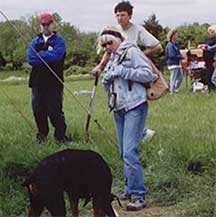
“It’s better to be told no than to miss an opportunity you might have had because you were too scared to ask.”
WOW: Most writers find that their research for one article or book can lead to ideas for others. I’m sure this is particularly true for you, since forensics is such a “hot” topic right now and the possibilities for writing projects seem endless. Where do you come up with the ideas for your books and articles?
Katherine: Mostly from a combination of serendipity and my intentional exposure to a wide range of subjects. I read a lot of different types of things (I learned this habit from Dean Koontz), but I’m always ready for an inspiration or an opportunity to strike. I remember that once I was visiting a friend in Oklahoma and we went into a very small bookstore. There I saw True Stories of Law and Order, and by the end of the week I had a contract for True Stories of CSI. Sometimes I look for opportunities, such as when I first saw CSI when it aired in the fall of 2000. I immediately knew there was a book in it and when an editor called, I was ready to deliver. In fact, I wrote that proposal in an hour on the same day she asked.
With Piercing the Darkness, the disappearance of a reporter researching the vampire community sparked the inspiration that I should follow her trail, and the acquisition of a haunted ring during that escapade gave me the idea for Ghost. I have found it to be quite true that chance favors the prepared mind. It doesn’t always work out, but it has done so enough times that I remain observant, informed, and ready. I recall during one lunch with my agent, we simultaneously mentioned a history of serial murder,
which led to my writing The Human Predator, and while doing that, I noticed certain things in the research that weren’t right for this book but which then led into Beating the Devil’s Game (a history of forensic science) and The Devil’s Dozen. I never question synchronicity; I work with it. Once I attended a dinner at which Henry Lee was in attendance. By chance I ended up next to him. At some point, he bemoaned the fact that he’d just lost his co-writer on a book that was overdue. So there I was, a writer…and I became his co-author that evening. One never knows.
WOW: You’ve collaborated with other writers and forensic professionals for a number of projects. How do you decide to work with a collaborator or co-author? What is that process like?
Katherine: Each book with a collaborator has been different. Usually I spot someone who I believe has a story to tell and I approach him or her. I’m generally the main writer, but they have their part, whether it’s to show me their case notes, describe their work, or invite me along. It’s never an easy process because I’m very organized and efficient, with internal deadlines. Others rarely have such tight agendas, so it can hinder my ability to do what I envision, but usually it all works out. My collaborators generally accept that I know what I’m doing. There’s no formula for collaboration, because each book has its own requirements and each collaborator has his or her own schedule and abilities. For Into the Devil’s Den, the collaborators approached me.
A biker who had infiltrated the Aryan Nations for two years wanted to write about it and he had a manuscript that needed to be shaped. He’d worked with an FBI handler, and against all odds, they became friends, so I suggested that we get both of them involved, cutting their voices together throughout the story, to give it a sense of interaction. It was unique and fun, and in 2008 that book won the New Mexico Book of the Year Award. I generally try to write about something or write in such a way that I’m exploring new ground. Thus, I pick collaborators who are significant in that process. (One collaboration, A Voice for the Dead, got me onto an exhumation team as an official member.)
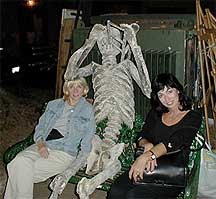
“Nothing throws you back on yourself and forces you to address your skills like acquiring and shaping the details of someone else’s life.”
WOW: Switching gears slightly, you’ve written biographies on bestselling authors Dean Koontz and Anne Rice. Besides the obvious connections between their work and the subjects you write about, what made you want to write about those two particular authors? What were those experiences like?
Katherine: Each process was quite different. In 1989, I’d written only one book, a philosophical treatise called Engaging the Immediate, when I approached Anne Rice. I was teaching philosophy at Rutgers and for “Philosophy in Literature” I had paired The Queen of the Damned with Albert Camus’ novel The Fall. As a result, I grew curious about the sort of author who would write such a complex book about a genre figure like the vampire. Somehow that curiosity worked itself into “Why don’t I write her biography?” (That’s what I mean about immersion.) So I called her up to ask. She didn’t say yes, but I had worked up a proposal and I reminded her of what she’d once said in an interview, that people should be allowed to go for whatever inspired them.
What could she say to that? She was intrigued with my approach via philosophy, so she decided to work with me.
It didn’t seem like a difficult task when I’d first envisioned it, but it was. Both of my biographies were more difficult than any other book, because you feel the pressure of getting a real person’s life story right while also making it interesting. And the details are endless; there’s no real closure. Nothing throws you back on yourself and forces you to address your skills like acquiring and shaping the details of someone else’s life.
With Dean Koontz, I’d considered him because I’d heard he had a difficult childhood, but people who knew him warned me that he was a private person and he’d never agree. Still, there he was at a conference one day, so I figured, “What the heck? I might as well ask.” He said yes, which launched a six-month long mission to write a solid proposal by reading 70-plus novels and learning about his life. I knew it was possible he would read the proposal and change his mind, but I was willing to gamble on having the opposite effect. The more I worked on it, the more interesting I found him, because I was learning about the writing process and the difficulties of publishing throughout several successive eras. He seemed to like the types of questions I asked because they grew organically from within his experience and got him thinking about his writing from a more personal angle. And we laughed a lot. He has a great sense of humor.
Both biographies were daunting tasks but both subjects were generous and helpful. I would do another one, but I’d probably map a better strategy of approach. I was lucky. I had other credentials that made up for my lack of writing experience.
WOW: You’re a very prolific writer. Are you working on several projects at the same time?
Katherine: Usually. There’s a saying, “A change is as good as a rest,” and I live by that slogan. My home office is filled with piles, each one for a different project. Right now, as I look around, I have about a dozen. Some are for articles, some for books, some for other types of writing projects—even a TV script. It’s crazy and sometimes I feel as if I’ll simply break down from the pressure, but so far I’ve always met deadlines and produced what I’d envisioned. I’m always either under a deadline or trying to get under one by forming or polishing a proposal. Apparently I can handle multiple trains of thought simultaneously. I won’t try to diagnose what this might portend.
WOW: Juggling the writing life with the other commitments of everyday life is always a challenge for writers, but you have the added tasks of doing extensive research for your projects and serving as department chair at DeSales University. How do you balance it all?
Katherine: Not easily. I keep daily lists. Whenever I ponder taking on another project, I compare its long-range demands against those to which I’ve already committed. If I think I can fit it in and I want to do it, I say yes. I’ve never missed a class over a deadline, but when I accepted the responsibility to be chair of my department, I did cut back on my writing commitments. Fortunately, my longtime friends have come to understand that I have “seasons” in which I’m available. They work with it. Media appearances are more difficult because they can come from out of nowhere and they’re usually on a tight deadline. Since they’re also quite time-consuming, I weigh their value to me against the other things I must do. And I have walked out on media people who were wasting my time. It happens, but I usually try to be cooperative.
WOW: You must read a lot as well, both as part of your research and to unwind. What do you like to read? Do you find yourself reaching for something lighter after writing about so much dark material?
Katherine: I read mostly nonfiction. It might be a crime narrative or psychological theory, or even a cultural expose. Right now I’m reading A Traffic of Dead Bodies about 19th century anatomy, Men to Boys about the social forces in male regression, The Talent Code, and an amicus brief about competency standards for court. I also read a lot of science. My college mentor once said “When you pick up a book, you gamble with your life.” By that I understood you need to choose judiciously because life is short and reading takes time. Make it count. If I read fiction it’s usually historical. Nothing is light, but it’s also not horror or vampire fiction, unless it’s literary. Actually, I watch more movies than I read for pleasure.
Since I write so much, which involves a lot of reading, I tend to settle back for a good film. Usually drama, and anything by the Coen brothers or featuring Johnny Depp.
WOW: Which is the biggest motivator for you—teaching or writing?
Katherine: There’s no contest; it’s writing. Both afford me a venue for learning, but writing offers momentum and exploration in ways that teaching does not. And I don’t like to teach unless I’m teaching a subject for which I have passion. I’ve been fortunate to find a university that supports me, allowing me to develop a forensics program and design the courses I teach. That’s not always possible. Now, if someone were to let me teach forensic philosophy….
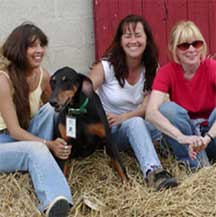
“There are no hierarchies in my world; it’s all about learning.”
WOW: You must work with quite a large number of students who are as passionate about these subjects as you are. Have you ever collaborated with any of your students on writing projects?
Katherine: I have collaborated with several students. I once set up a research internship, the end product of which was a publishable essay for the Court TV Website. Unfortunately, Court TV was replaced in 2008 by TruTV, so the internship ended. But I have several collaborations with students with which I’m pleased. Even now, if a student did some original work and wanted to collaborate for another type of publication, I’d consider it. In fact, I’m working right now on a piece about computer forensics with a former master’s student who is also a detective. More interestingly, one of my prior collaborators is about to become one of my students. There are no hierarchies in my world; it’s all about learning.
WOW: What can you tell us about your upcoming projects?
Katherine: I don’t like revealing details because I think it’s an energy leak—the more you talk about a project the less enthusiasm you have for writing it. In vague terms, I currently have three books in the process of publication, one book going under contract, and four being developed into proposals. I also have a finished manuscript out to editors, and I have three chapters due for other people’s books. In addition, I have ideas outlined for future proposals and am discussing two future collaborations. On top of that, I have a dozen extracurricular presentations lined up over the next six months. I guess it’s obvious that I can’t bear having nothing to do.
WOW: Can you offer any advice to women writers who want to break into the forensics or true crime genres?
Katherine: I don’t actually consider myself a true crime writer, but in general, for any field, I live by this: find your passion, get a specific focus that’s unique and will get attention, follow it wherever it leads, and remember that it’s better to be told no than to miss an opportunity you might have had because you were too scared to ask. If you want to enter a genre that requires professional credentials, go back to school or take some online courses. I got a master’s degree just to shift my writing into the forensic arena. It was a lot of time and money, but it has changed my life. I also encourage people to volunteer in relevant organizations to get experience and to write for free to get published clips. Blogs don’t count, not even a guest blog. It should be something that will garner respect because it’s been accepted and gone through an editorial or peer-review process.
The point is to get busy editors to believe you’re worth their time, so show your commitment by learning the discipline, getting some experience, and acquiring the right vocabulary.
WOW: There seem to be more and more students who want to make forensics a career, and become crime scene investigators like those on CSI and NCIS. What does the future hold for this field?
Katherine: Forensic science is going through a tumultuous time right now, because a recent two-year scrutiny has revealed many holes in a lot of areas. I’d say that anyone who is serious about getting into this field should read the 2009 National Academy of Science report about the forensic sciences, because it will influence the future. Despite some of the alarming revelations, the report signals a time of possibilities as well, with more cross-disciplinary work and accelerated discoveries. I think people who are interested in this area should read, read, read, and identify areas that no one has yet covered. That’s what I’ve done for years.
WOW: Great advice! Thank you, Katherine, for taking time to chat with us today and for sharing your wisdom and stories! It’s been such a pleasure.
Readers, find out more about Katherine by visiting her website: www.katherineramsland.com
***
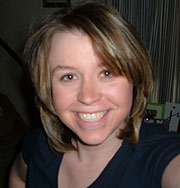
Sara Hodonis a freelance writer based in Northeast Pennsylvania whose work has appeared in History, Harrisburg Magazine, Young Money, and WritersWeekly.com. She discusses the trials and triumphs of the writing life on her blog, Adventures in the Writing Life (https://adventuresinthewritinglife.blogspot.com).